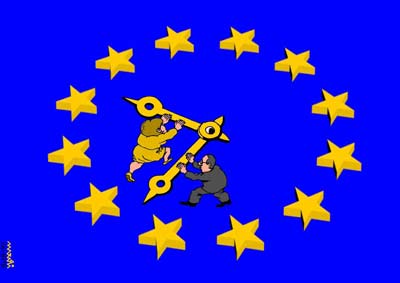
Jeremy Siegel, a professor of finance at the University of Pennsylvania’s Wharton School, echoes a lot of what some of us have been saying for years about the infeasibility of internal devaluation in a commentary article published in the Financial Times on May 22, but then he argues that the answer is devaluation of the euro as a whole.
Um, against whom?
I mean, it’s not as if the United States or Japan are towers of economic strength, easily able to provide the demand Europe lacks. That leaves emerging markets. And while I and others have been pushing for years for an end to Chinese currency manipulation, China is at this point (a) not looking very strong itself and (b) just not that big in the world economy — not yet.
More generally, Europe as a whole, like the United States, remains a relatively closed economy. Its salvation must be mainly internal. Now, if devaluation is a code word that means raising the inflation target, fine.
The last time I got to hear the late economist James Tobin, he gave a talk in which he joked that as far as he could tell, all the world’s major currencies needed to devalue against each other. This is sort of one of those times — and what that actually tells you is that we need fiscal and monetary stimulus.
Keynes and the Euro Crisis
I just saw, and now cannot find, a comparison between Germany’s position vis-a-vis the European periphery now and the United States’ position vis-a-vis European nations with war debts after World War I. Anyway, it’s a very close parallel. Read from John Maynard Keynes’s “Essays in Persuasion”: “Ultimately, and probably soon, there must be a readjustment of the balance of exports and imports. America must buy more and sell less. This is the only alternative to her making to Europe an annual present,” the economist wrote in 1921. “Either American prices must rise faster than European (which will be the case if the Federal Reserve Board allows the gold influx to produce its natural consequences), or, failing this, the same result must be brought about by a further depreciation of the European exchanges, until Europe, by inability to buy, has reduced her purchases to articles of necessity.”
Mr. Keynes then goes on to discuss the folly of American policy, which simultaneously demanded that the Europeans pay in full while denying them the ability to export enough to make those payments.
So here too we are repeating ancient mistakes. But why does nobody learn?
Trump is silencing political dissent. We appeal for your support.
Progressive nonprofits are the latest target caught in Trump’s crosshairs. With the aim of eliminating political opposition, Trump and his sycophants are working to curb government funding, constrain private foundations, and even cut tax-exempt status from organizations he dislikes.
We’re concerned, because Truthout is not immune to such bad-faith attacks.
We can only resist Trump’s attacks by cultivating a strong base of support. The right-wing mediasphere is funded comfortably by billionaire owners and venture capitalist philanthropists. At Truthout, we have you.
Truthout has launched a fundraiser to raise $41,000 in the next 7 days. Please take a meaningful action in the fight against authoritarianism: make a one-time or monthly donation to Truthout. If you have the means, please dig deep.